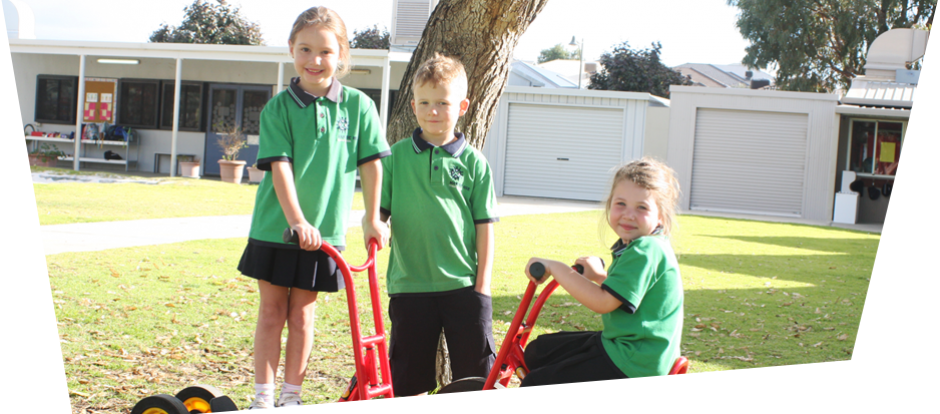Rationale
Australia has the highest rate of skin cancer in the world. Overexposure to the sun during childhood and adolescence is an important contributing factor to the development of skin cancer later in life. As students are at school during times of peak ultraviolet (UV) radiation, schools can play a major role in creating a supportive environment that minimises exposure and encourages sun protective behaviours.
Our sun protection policy has been adopted to ensure that all students, staff, parents and visitors attending Makybe Rise Primary School are protected from skin damage caused by UV radiation from the sun. This policy is to be implemented throughout the year, but with particular emphasis from the beginning of September through to the end of May. The sun protection practices outlined in this policy will be applied to all school activities, including sports carnivals, excursions and camps. The policy has been developed in consultation with the whole school community.
Our Commitment
Makybe Rise Primary School will:
- Inform parents of this sun protection policy when they enrol their child/children.
- Brief all new staff on the sun protection policy.
- Promote sun protection via newsletters, assemblies, daily messages, whole school activities, and parent and staff meetings.
- Require students to wear broad-brimmed, bucket or legionnaire hats when outside.
- Direct students without a broad-brimmed, bucket or legionnaire hat to stay in an area that is protected from the sun.
- Require staff to wear broad-brimmed, legionnaire or bucket hats for all outdoor activities, including yard duty.
- Encourage parents and guests to wear broad-brimmed, legionnaire or bucket style hats when participating in and attending outdoor school activities.
- Require students to wear broad-brimmed or bucket hats, sun protective clothing and sunscreen for all camps, sports and excursions. These items will be listed on the parent permission form.
- Require staff and students to wear a swim (rash) top for swimming (this may not be appropriate during competitive swimming.)
- Review the school dress code to include sun protective items such as shirts with collars and longer sleeves, and swim tops for swimming.
- Strive to ensure there is adequate provision of shade within the school grounds for students and staff, by planting trees and building shade structures. Particularly in areas where students congregate, for example, lunch, canteen, outdoor lesson areas.
- Encourage staff and students to use shaded or covered areas when outside.
- Ensure that adequate shade is provided at sporting carnivals and outdoor events.
- Timetable as many outdoor activities as possible – including assemblies, sport and physical education – when the UV index is below 3. When this is not possible activities should be scheduled as far from 12 noon as possible.
- Encourage the use of SPF 30+ broad-spectrum, water-resistant sunscreen by:
- listing sunscreen as an item students are required to buy for the school year.
- asking parents to put sunscreen on children as part of their morning routine before school begins at home.
- providing sunscreen in the classroom.
- Incorporate sun protection and skin cancer awareness programs into the appropriate Key Learning Areas of the school curriculum.
- Review the sun protection policy annually.
Our Expectations
Parents/carers will:
- Ensure your child/children has a broad-brimmed, legionnaire or bucket style hat.
Cancer Council WA recommends the following hats:- broad-brimmed (7.5 cm brim)
- legionnaire-style
- bucket/surfie-style (6 cm brim)
- Ensure that your child/children’s clothing provides adequate protection from UV radiation. Cancer Council WA recommends the following:
- collars and sleeves
- closely woven fabric
- natural fibre
- swim (rash) tops for swimming.
- Ensure that your child/children has/have access to SPF 30+ broad-spectrum, water-resistant sunscreen before leaving for school.
- Act as positive role models by practising SunSmart behaviour.
- Support the school’s sun protection policy, and help design and regularly update the policy.
Students will:
- Be aware of the school’s sun protection policy.
- Take responsibility for their health by being SunSmart.
- Comply with SunSmart rules and guidelines by wearing suitable hats and clothing.
- Use shaded or covered areas outdoors wherever practicable.
- Act as positive role models for other students in all aspects of SunSmart behaviour.
- Be actively involved in initiatives to protect the school community from over-exposure to the sun.
- Help design and regularly update the SunSmart policy.
- Participate in SunSmart education programs.
Evaluation
Principal and Implementation Committee will review the effectiveness of this policy each year and make any necessary changes.
They will:
- Review the SunSmart behaviour of students, staff, parents and visitors and make recommendations for improvement.
- Assess shade provision and usage and make recommendations for increases in shade provision.
- Update and promote curriculum material relevant to SunSmart activities.







